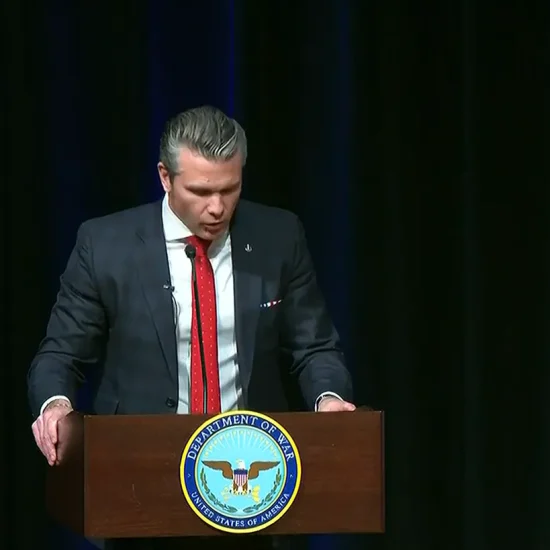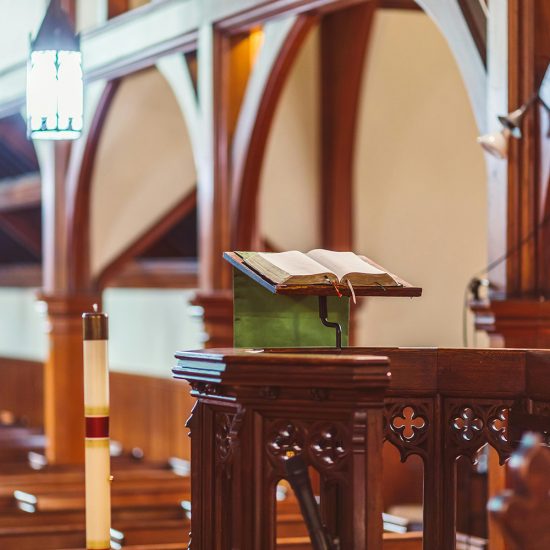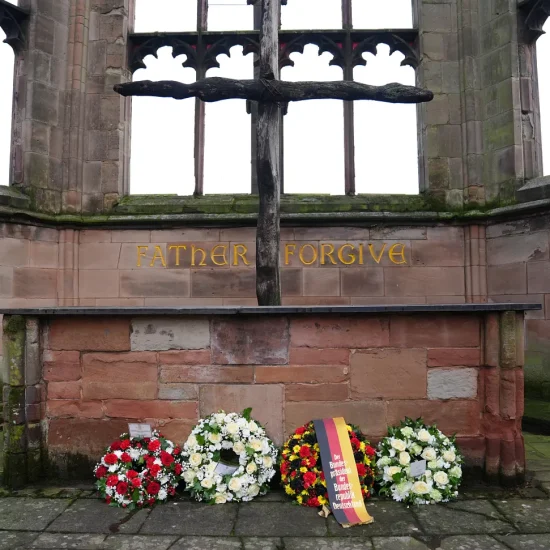For most Christian Americans, the holiest week of the year looks like most others. People purchase Starbucks lattes without lamenting the design of the cup and shop at Target without critiquing the greeters’ salutations. They may stop by their local courthouse, but it won’t be to protest the removal of an Easter scene from the town square.
In a moment when breathing air seems to stir controversy, Easter has somehow avoided it. Which is especially interesting once you recall that Christmas — the only Christian holy day more popular than Easter — has somehow become a recurring scandal.
Easter and Christmas, as they have come to be known in American popular culture, are strikingly similar. Both mark significant events in Jesus’s life; his birth for Christmas and his resurrection for Easter. Both are celebrated by attending religious services, hosting family meals, and other communal festivities. And both holidays have been wrapped in a secular, consumerist folklore. On Christmas, children wake to find presents brought to them by a fictitious character named Santa Claus. On Easter, children wake to find a basket filled with trinkets and candy brought to them by a fictitious character called the Easter Bunny.
So why has Christmas become a cause for protest while Easter is almost completely uncontroversial?
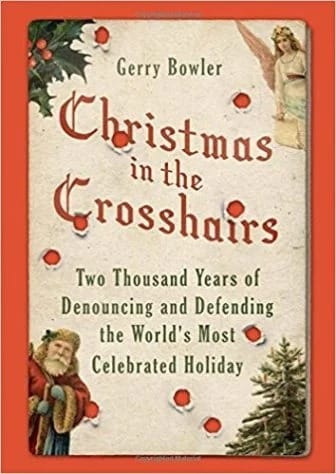 Image courtesy of Oxford University PressTo explore this question, I decided to chat with Dr. Gerry Bowler, a historian who specializes in religion and popular culture. He is author of “Christmas in the Crosshairs: Two Thousand Years of Denouncing and Defending the World’s Most Celebrated Holiday.” He shares some fascinating insights about the historical difference in these holy days that explains why Easter has escaped the furor that now comes with Christmas.
Image courtesy of Oxford University PressTo explore this question, I decided to chat with Dr. Gerry Bowler, a historian who specializes in religion and popular culture. He is author of “Christmas in the Crosshairs: Two Thousand Years of Denouncing and Defending the World’s Most Celebrated Holiday.” He shares some fascinating insights about the historical difference in these holy days that explains why Easter has escaped the furor that now comes with Christmas.
RNS: Every year as the holidays approach, I hear rumblings about the “War on Christmas.” Trump, for example, has often claimed often that the holiday is under siege. Why is this?
GB: President Trump is correct. There is, and has always been, a war on Christmas. He is referring to a particular front in that conflict: the debate over what public space is to be given in the USA to religion. Thus, his emphasis on the ability to say “Merry Christmas” as opposed to “Happy Holidays” or to send a Christmas card instead of one mentioning “Season’s Greetings.” The war, however, is much older than this aspect and contains many more points of contention.
RNS: Talk about the history of this “war.” When did it begin, and how did it become so widespread?
GB: The first arguments about Christmas began in the early Christian Church when theologians disagreed as to the propriety of celebrating the Nativity of Jesus. Some thought this was the sort of thing best left to pagans. When the Church eventually decided that a celebration was proper, the next debate was over the proper date. Western churches opted for December 25 and the cities in the east preferred January 6.
Then arose a centuries-long struggle to keep pagan accretions out of the holiday, a struggle that was sometimes lost — thus the giving of gifts, the Yule log, and perhaps the Christmas tree — but which was successful against transvestism, riotous social inversion, and wearing animal costumes. The Protestant Reformation brought the abolition of Christmas for a time in England, New England, and Scotland. The Enlightenment and modernity proposed the replacement of religious ceremonies with secular equivalents. Some totalitarian governments such as Nazi Germany tried to paganize Christmas while communist states tried to repress it altogether.
Today, the war rages around the world with opposition from atheists, hard-line Hindus and Muslims, and neo-Calvinists, and attempts by LGBT people, vegans, anti-consumerists, and nationalists to appropriate the season to their own ends.
RNS: Generally speaking, which holiday has been more important to Christian communities throughout history?
GB: Theologically speaking, Easter is the most important date. The Resurrection outranks the Incarnation, Ascension, etc. Though the public involvement in Christmas is now greater, this has varied in time and place.
RNS: It seems to me that Christmas and Easter have similar histories and importance in the West. And both have developed a set of popular symbols — mistletoe and colored eggs, Santa Claus myths and Easter bunny myths — that now overshadow their religious meanings. What do you think?
GB: Overshadowed in the public mind, but not in the minds of the faithful. Churches are packed during the Easter and Christmas seasons. There is no sign that these celebrations have diminished in the lives of practicing Christians. In parts of the world where Christianity is under threat, believers will risk terrorist attacks and government prosecution to attend public services.
RNS: Don’t Easter and Christmas both have pagan roots?
GB: Not at all. Nothing in the Nativity or the Resurrection is pagan. They are the central core of Christianity. There are a number of add-ons or accretions that have a pre-Christian origin. For example, the English name “Easter,” eggs, bunnies, pooping logs, or gifts.
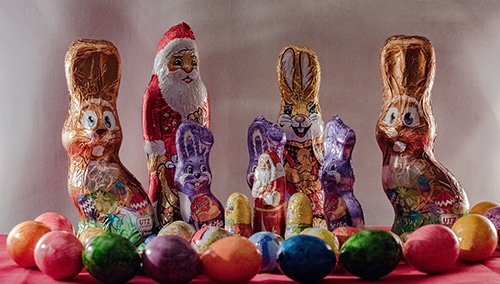 RNS: Do you think there is anything wrong with pairing sacred holidays with secular celebrations and symbols like this?
RNS: Do you think there is anything wrong with pairing sacred holidays with secular celebrations and symbols like this?
GB: Not in principle, but it is problematic, lest the secular taint or overwhelm the religious. For Christians, the Incarnation and Resurrection are things to be very happy about and we have spent centuries finding diverse ways to celebrate with dances, feasting, bizarre customs, parades and marvelous music. Christians don’t mind sharing these holidays with the rest of the world which is invited to sing our songs, eat our ritual food, and share the good feelings.
RNS: Talk about anti-Christmas carols. What groups have promoted these and why?
GB: Soviet atheist groups such as the League of the Militant Godless sang songs based on Christian material mocking religion. Nazis produced a version of “Silent Night” which included references to Adolf Hitler. Nowadays, the virulently anti-Christmas Westboro Baptist Church has a veritable arsenal of Christmas carol parodies, the most notable of which is “Santa Claus Will Take You to Hell.” Other neo-Calvinist churches have milder anti-carols. For example, “I’m Dreaming There’ll be No Christmas” or “Banish Christmas,” to the tune of Mel Tormé’s “Christmas Song,” where instead of roasting chestnuts we have the unfortunate Michael Servetus, executed for heresy in John Calvin’s Geneva in 1553:
Servetus roasting in an open fire
John Knox preaching where he can
Calvin teaching against every sin
The folk all look so Puritan.Everybody knows idolatry is wickedness
for papist, Protestant or Jew.
Though some people say,
They got carried away
Banish Christmas here, too!
Atheists sing:
On the 12th day of Christmas, my true love gave to me,
12 happy humanists…
11 atheists doubting…
10 biologist dissecting…
9 agnostics wondering…
8 physicists arguing…
RNS: Do any of these groups protest Easter to your knowledge?
GB: Yes, the neo-Calvinists are opposed to Easter. The folks at Westboro Baptist Church call it “idolatrous, unscriptural, pagan…an invention of the Catholic Whore.” Atheists seem to be less invested in attacking Easter than Christmas but some seem willing to go to the effort.
Recently in Eugene, Oregon an atheist has contacted the ACLU over a banner urging the celebration of Christmas and Easter, claiming to feel “assaulted” by the message. University of Wisconsin atheists have staged campaigns mocking Easter. In 2017, they erected a poster at the state capitol urging people to “forget their guilt” on Easter and “have a happy April 16th.” The Chinese Communist Party forbids its members to celebrate either Christmas or Easter.
RNS: If the notion that Christmas has been hijacked by secularists and liberals is bothersome to conservatives, why do you think there isn’t a widespread “War on Easter?”
GB: Christmas is celebrated much more publicly and intensely than Easter, at least in North America and is marked by many who are not overtly religious. It is the biggest phenomenon on the planet, dwarfing any rock festival, sports tournament or other holiday. It occupies probably 10 percent of our lives in preparing for it, celebrating it, and paying for it.
That makes Christmas the obvious target of those who oppose any place for religion in the public sphere or those who oppose Christianity specifically. In those times when Christianity was suppressed such as the French Revolution, Nazi Germany, the USSR or the Mao era in China, Easter was victimized in the same way as Christmas.




